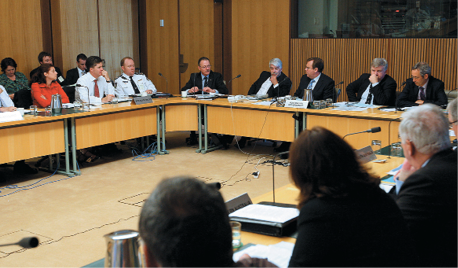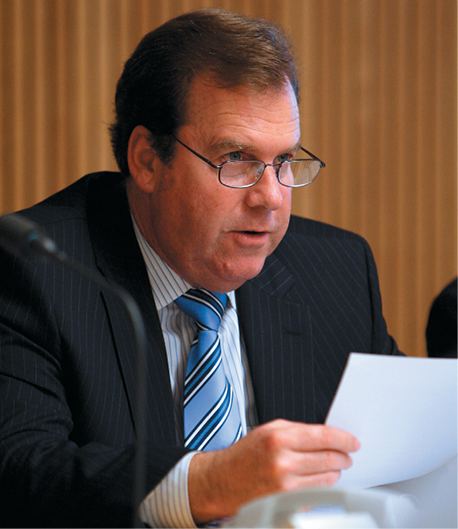
Communiqué, Canberra, 25 September 2009
The Ministerial Council for Police and Emergency Management (MCPEM-EM) today held an extraordinary meeting to consider preparedness for the coming bushfire season. The Council is chaired by the Australian Attorney-General Robert McClelland. It also comprises Ministers from State and Territory Governments, New Zealand and a representative from the Australian Local Government Association.
MCPEM-EM also discussed other natural hazards such as cyclones and floods.

DGEMA, Secretary and Attorney-General at the Ministerial Council for Police and Emergency Management Meeting
The Council discussed the outcomes of the pre-season operational briefing held today, prior to the Council’s meeting. They noted the seasonal outlook for fire and cyclone, Commonwealth support arrangements to jurisdictions, and response plans and arrangements for timely deployment of Commonwealth resources.
The Council noted the Commonwealth’s commitment of $2 million for implementation of national priority emergency management projects in 2009-10; prioritised by the Council’s standing committee, the Australian Emergency Management Committee. The projects include:

Attorney-General, The Hon. Robert McClelland MP at The Ministerial Council for Police and Emergency Management meeting
The Council noted progress on the development of the National Emergency Warning System capability. The Location-Based Number Store (LBNS), administered by the Commonwealth Attorney General’s Department, will be available for the warning systems to run tests by early October. It will comprise a secure, central database to hold geo-coded Integrated Public Number Database (IPND) data.
The National Emergency Warning System (NEWS), procured through a tender process administered by the Victorian Government, will be available by the end of October for comprehensive testing throughout November. After this testing, the system will be fully operational.
The Council endorsed the new national framework for scaled advice and warnings to the community including Australia’s revised arrangements for bushfire advice and alerts, with a new fire danger rating of Catastrophic (Code Red).
The Council agreed to a number of measures relating to the use of Emergency Triple Zero numbers during emergencies. These measures consist of:
The Council also noted the Commonwealth assistance in development of a number of public information projects which will reduce the non-emergency call loads on Triple Zero and a Commonwealth initiative to block mobile phone handsets of repeated non-genuine callers to Triple Zero.
The Council noted the outcomes of the National Workshop to Reduce Deliberate Bushfires in Australia on 25 March 2009 and was presented with a Draft National Bushfire Arson Action Plan, which will be further considered by Council at its November 2009 meeting.
The Council noted the passing of the Foreign States Amendment Act 2009 (Cth). The Act ensures that foreign government personnel assisting Australia in a domestic emergency or disaster are immune from tort proceedings in Australia arising out of that assistance.
Ministerial Council for Police and Emergency Management – Emergency Management